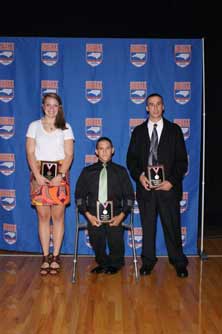Fuquay-Varina (N.C.) pitcher
Craig Mitchell had been playing baseball since he was 5 years old, but last summer he couldn't catch a fly ball or throw accurately to first base, let alone hit.

Emily Newton, Bradley Greeson andCraig Mitchell, from left to right, earnedNCHSAA Courage Awards afterovercoming significant obstacles.
Photo courtesy of the NCHSAA
No one could figure out what was wrong, until an MRI showed an acoustic neuroma, a tumor located right under the brain. So the day before New Year's Eve, Mitchell underwent a 19-hour brain surgery at UNC Hospital.
For his baseball coach, Milton Senter, it would have been enough for Mitchell to be healthy enough to just put on a uniform for his senior season. But Mitchell did more than that — he regained his role as the team's closer in time for the postseason.
"We would have been happy if came through the surgery OK. This is just gravy," Senter said. "It's been a wonderful experience to see how far he's progressed and how good his attitude is."
For his inspirational comeback, Mitchell was one of his recipients of the Courage Award, presented by the North Carolina High School Athletic Association to honor individuals who demonstrate exemplary character and performance despite adversity.
Mitchell accepted his award earlier this month along with
Southern Alamance (Graham, N.C.) wrestler Bradley Greeson, who went 46-23 in his career despite being unable to use his legs, and Broughton (Raleigh, N.C.) center
Emily Newton, who played basketball after needing a liver transplant.
Mitchell was shocked when he first saw the results from the MRI.
"I couldn't believe it," Mitchell said. "I never thought something like that would ever happen to me. I always thought I was healthy."
Before his surgery, doctors told him he wouldn't play baseball this year, but he was determined. He was on an exercise bike by Feb. 1 and eventually worked his way back into the lineup. His return to the mound came in a nonleague game against West Johnston (Benson, N.C.) on March 9 — his brother Brian, a sophomore catcher on the JV team, was called up to catch for the occasion — and Craig threw two scoreless innings in a 9-3 win.
Soon he regained the role of closer.
"We have the confidence to put him in any situation," Senter said. "We don't worry about it, this is a guy who had brain surgery. We know he can pitch."
While Mitchell grew up playing baseball, Greeson never thought about wrestling. He has spina bifida, which make his legs basically useless, and has already undergone 13 surgeries. But using crutches since the third grade gave him incredible upper-body strength, and coaches encouraged him to try wrestling after he was spotted doing handstand push-ups on the track during the homecoming football game.
"His upper body strength is 160 pounds and he wrestles 103 pounds. He's just a beast up top," wrestling coach Sean Quinn said. "If Bradley got a hold of you, you weren't getting away."
Still, Quinn didn't know how to teach Greeson to wrestle at first. For pointers they watched tape of Arizona State's Anthony Robles, who was born without a right leg and was the NCAA champion at 125 pounds this year. But mostly Greeson took part in the same workouts as the rest of the team, or found another way to accomplish each drill.
Soon he became an important contributor to the team, and he was on pace to win his conference tournament this year until he was sidelined with a foot infection that eventually required season-ending surgery and the amputation of a toe.
"I don't think anybody realizes how much courage it took for him to set those crutches down and compete on the mat every day," Quinn said. "It takes guts to wrestle, let alone go out there knowing you're a little behind athletically of the kid you're going to wrestle. And he knew we depended on him for points and we expected him to win."
Like Mitchell, the effects of Newton's ailment became apparent when she was playing her sport. A basketball player since the age of 5, she was suddenly sluggish on the court during her sophomore year and could barely make it through a practice. The people around her thought it was just laziness, but it turned out to be much worse.
"I was tired all the time, sleeping all the time," Newton said. "The doctors thought it could be mono, but the test was negative. So they were still concerned and then about midway through my sophomore year we found out I was dying."
Specifically, Newton had a Wilson disease, a rare genetic liver disorder, and she needed a transplant immediately. She underwent surgery on March 3, 2010, started training again four months later and incredibly was back with the team for this past season.
It took time for Newton to get comfortable to the physical contact in the post, but she was a motivational force at practice and once her conditioning improved, she was back to playing in games.
"Her energy just spread through the team," sophomore forward Nicole Bellamy said.
Now Newton hopes to inspire more people after winning the Courage Award.
"I hope that people who are going through challenges can benefit from hearing my story," Newton said.
